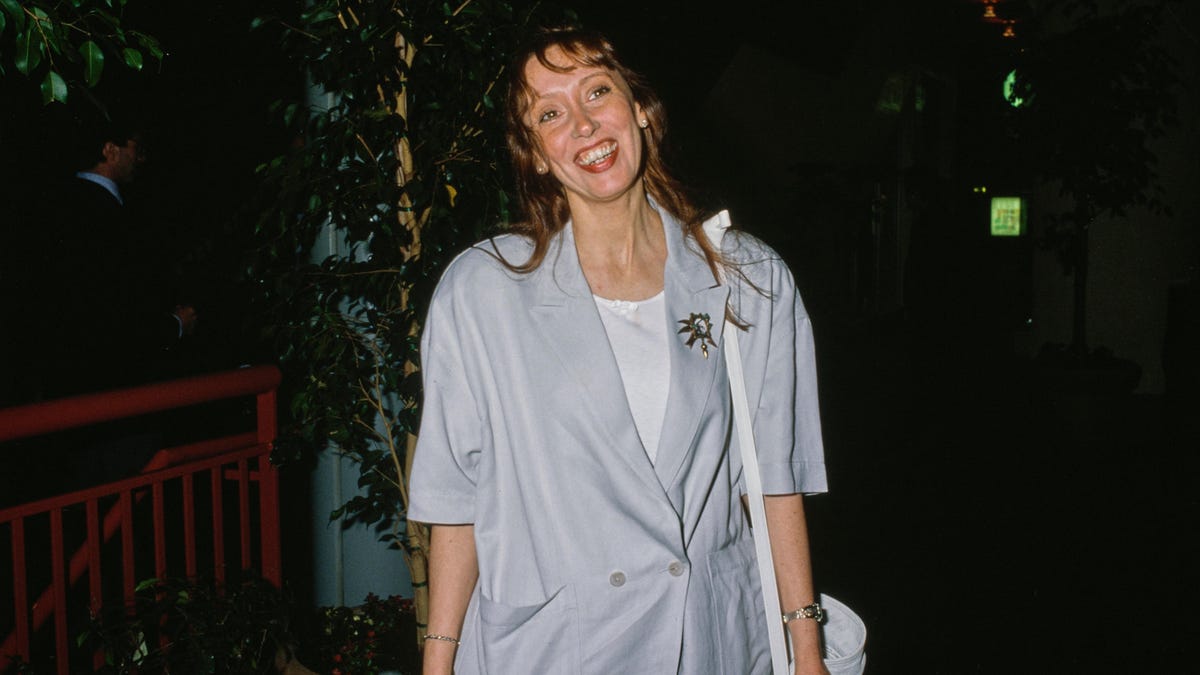Shelley Duvall—star of Stanley Kubrick’s The Shining and multiple films by her mentor, Robert Altman—has died. The news was confirmed by her life partner, Dan Gilroy, who told The Hollywood Reporter that she died in her sleep in her home in Blanco, Texas, due to complications from diabetes. “My dear, sweet, wonderful life partner and friend left us. Too much suffering lately, now she’s free. Fly away, beautiful Shelley,” Gilroy shared. She was 75.
Jessica M. Thompson on "The Invitation" and everyone's favorite horror trope
Duvall was known for her eccentric characters and one-of-a-kind, wide-eyed facial expressions. She began her career starring in the films of director Robert Altman, whose team discovered her at a party in her native Texas when she was only in junior college. Her onscreen debut came in 1970’s Brewster McCloud, in which she played an Astrodome tour guide named Suzanne Davis. “I got tired of arguing, and thought maybe I am an actress. They told me to come. I simply got on a plane and did it. I was swept away,” she said of committing to the role in 1977.
From there, Duvall would go on to star in six more Altman films. Those projects included McCabe & Mrs. Miller (1971); Thieves Like Us (1974), in which she played a woman who falls in love with a bank robber; Nashville (1975), in which she played a groupie named L.A. Joan; Buffalo Bill and the Indians, or Sitting Bull’s History Lesson (1976), a revisionist Western film in which she played the wife of President Grover Cleveland; 3 Women (1977), which earned her a Best Actress award at Cannes; and Popeye (1980). According to THR, Altman once raved that his frequent collaborator “was able to swing all sides of the pendulum: charming, silly, sophisticated, pathetic, even beautiful.”
In 1980, she portrayed Wendy Torrance in The Shining, the role she is best known for. But while Wendy remains one of horror’s most iconic characters ever—largely due to Duvall’s perfect scream while trying to avoid the ax of her crazed husband, Jack (Jack Nicholson)—the mythology around her experience behind-the-scenes has grown to almost mythic proportion. Still, it is true that the 13-month shoot was especially grueling. In 1981, Duvall told People Magazine that Kubrick had her “crying 12 hours a day for weeks on end,” with one report (via THR) claiming that she was forced to shoot her final-act scene with the baseball bat an exhausting 127 times. “I will never give that much again,” she said. “If you want to get into pain and call it art, go ahead, but not with me.”
But despite the outsized place it holds in cultural imagination, The Shining was far from Duvall’s only role. She also appeared in Woody Allen’s Annie Hall (1977), Terry Gilliam’s Time Bandits (1981), Jane Campion’s Henry James adaptation, Portrait Of A Lady (1996), and many more. In 2023, she returned to the screen after a two-decade long absence for The Forest Hills, a horror film written and directed by Scott Goldberg.
Duvall’s expansive career also included multiple television roles in projects such as The Twilight Zone, The Ray Bradbury Theater, L.A. Law, Aaahh!!! Real Monsters, and Frasier. In 1982, she narrated, starred in and executive produced the Peabody Award-winning children’s series Faerie Tale Theatre, which featured 27 episodes of well-known actors like Robin Williams, Anjelica Huston, Bernadette Peters, Liza Minelli, Carrie Fisher, and more retelling classic Brothers Grimm stories. Three years later, she created a similar series for Showtime called Tall Tales & Legends, that ran for nine episodes and earned her an Emmy nomination.
Building off the success of these two programs, Duvall also launched a production company called Think Entertainment in 1988, which focused on family entertainment like 1989’s Poe-focused Nightmare Classics, Shelley Duvall’s Bedtime Stories (1992), and Mrs. Piggle-Wiggle (1994). In 1991, she also recorded two albums: Hello, I’m Shelley Duvall...Sweet Dreams and Hello, I’m Shelley Duvall...Merry Christmas.
Duvall “looks and sounds like almost nobody else… and has possibly played more really different kinds of characters than almost any other young actress of the 1970s,” Robert Evert wrote of the actor in 1980. “In all of her roles, there is an openness about her, as if somehow nothing has come between her open face and our eyes — no camera, dialogue, makeup, method of acting — and she is just spontaneously being the character.”
Duvall is survived by her partner, Dan Gilroy, as well as her brothers, Scott, Stewart, and Shane.
